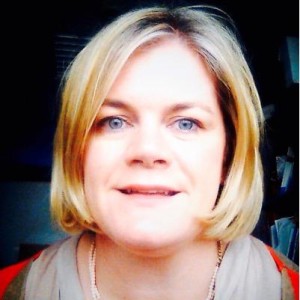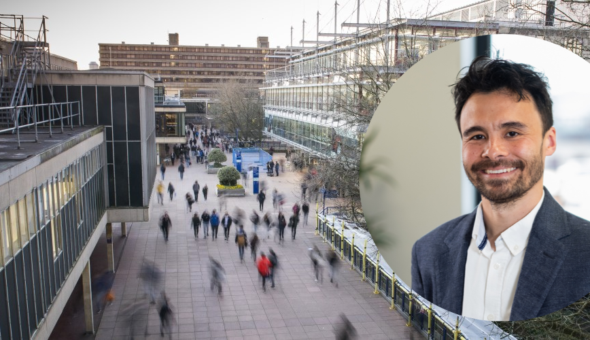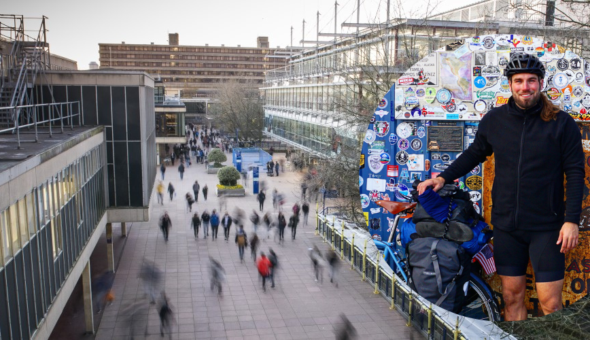Dr Denise Proudfoot completed her Professional Doctorate in Health from the University of Bath in 2014 while working as a nurse lecturer in Dublin City University. She has a background in mental health, primary care and sexual health promotion in nursing. Denise’s thesis is entitled ‘a narrative exploration of the experiences of mothers living with HIV in Ireland.’
She spoke about her research and Professional Doctorate experience with Dr Nathan Ryder from Viva Survivors. You can listen to the full interview and Podcast here.

Can you describe your research, and how you came to do a Professional Doctorate?
My research was a study with HIV positive mothers in Ireland. I set out to provide an understanding of their lives.
I originally worked as a Nurse in London specifically with people who are HIV positive and most of my case load were women. At this time there were limited options for drugs to be given to mothers during pregnancy that would have prevented the baby having HIV. In the mid-1990s the development of combination therapy, a combination of antiretroviral drugs had a significant effect on the health of people with HIV, and equally had a significant impact on the chances of a pregnant HIV positive woman having a HIV positive baby. So that’s had a huge effect on the lives of HIV positive mothers.
When I decided to do a Professional Doctorate I was trying to think about research, I wanted to do something I was passionate about and interested in. My background is in mental health nursing and general nursing, but I still had a huge interest in HIV.
I really wanted to look at what it’s like for women now, and in the last 15 years, what it’s like to be a mother. Increasingly the chances of your baby being born with HIV is very low as HIV positive woman now take medication in the second trimester of the pregnancy and this reduces the chance of having a HIV positive baby to less than 1%.
There’s been huge advances and developments in the area of HIV in the biomedical discourse. I wanted to examine at the social meaning of the process, and used a feminist mothering research approach to explore what it’s like to be a HIV positive mother, and maybe give voice to these women.
How did you make the transition from working in the area of mental and general health nursing to finding a supervisor and starting your research?
Since the early 2000s I have been working as a lecturer in nursing. A lot of my colleagues had started PhDs or Doctorates and I knew it was inevitable I would want to do one so I started looking at options. I came across the Professional Doctorate in Health at the University of Bath and started in 2007 as a part-time student, combining this with my lecturing at Dublin City University.
What was it like carrying out the research?
There has been little research in the last 10-12 years around women’s experiences, that’s something that came up in my literature review.
My study was a narrative study. I interviewed 11 mothers who were attending a HIV peer support centre in Dublin about their experiences. The research was enjoyable, the actual data collection which was interviews with mothers and women was really interesting and relatively straightforward.
What was the impact of your research?
One of the key findings I summarise in my thesis is being a mother impacts on the HIV experience. And vice versa, being HIV positive impacts on mothering. A lot of the women when they’re diagnosed their priority is their children, the first thing they want to know is ‘is my child HIV positive’ irrespective of the age of the child. Some woman were pregnant, some had young children, and others had older children. They are very child centred and this impacted on their responses to their HIV result.
Did you feel there were differences between a PhD and your experience on a Professional Doctorate?
Yes there are quite a few differences. The reason I chose a Professional Doctorate was because I like structure and the peer element of the programme was quite strong. In the first couple of years we did a lot of research training looking at both qualitative and quantitate methods which I think is important.
We had assignments which is different to a PhD where you have a narrower focus. I enjoyed the structure, and as I progressed through the programme there were milestones to achieve.
Another difference is you’re journeying with other people. The majority of people on the doctorate were mature students and senior professionals across health disciplines so you have an interesting group of people to work with. Some were clinicians, whereas I came from an academic background in a practice discipline.
The thesis is smaller in the end compared to a PhD, but it’s very much quality as opposed to quantity at 45,000 words. One of the skills you develop is you have to be quite succinct, but I got a good overall research training, I feel I have a good understanding of other research methodologies that I might have got if I’ve done a PhD.
I was working full-time as an academic while I was a part-time student and it was quite challenging, but because I was in an academic environment it helped, I had access to alot of resources. Probably the last three years were the busiest for me.
What advice would you give to someone who is starting the Doctorate?
My advice is to choose a topic that you’re passionate about and interested in to sustain your interest over a long period of time. You learn an awful lot about yourself throughout the process. Keep going, take breaks if needed, there are times when it’s straight forward and times when challenging. It’s definitely worthwhile.
Dr Denise Proudfoot, Nurse Lecturer in Dublin City University
Professional Doctorate in Health 2014
Respond


